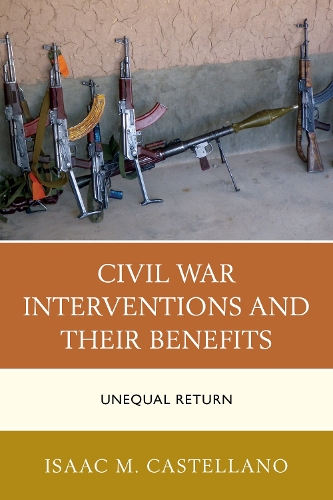
Civil War Interventions and Their Benefits: Unequal Return
(Hardback)
Available Formats
Publishing Details
Civil War Interventions and Their Benefits: Unequal Return
By (Author) Isaac M. Castellano
Bloomsbury Publishing PLC
Lexington Books
18th December 2014
United States
Classifications
Professional and Scholarly
Non Fiction
International relations
327.2
Physical Properties
Hardback
188
Width 163mm, Height 239mm, Spine 20mm
413g
Description
The 2013 debate over whether the United States should intervene in the Syrian conflict raised important questions regarding the benefits countries receive when they intervene in civil wars, and how those benefits are distributed to the citizens of the intervening country. To address these lingering questions this book offers readers a comprehensive examination of the intervention process, examining the decision to intervene, what motivates states, and how their intervention shapes the conflict process. Most, importantly, the book examines how states benefit from their interventions and the distribution of intervenor benefits. Specially two questions are addressed: What are the benefits of intervention for intervening countries And, how are benefits distributed within the intervenors society Using evidence compiled from three case studies (El Salvador, The Philippines, and Sri Lanka), this book examines what motivated states to intervene, how they intervened, what they got from their intervention, and how the benefits of the intervention were distributed among the public. Arguing that foreign policy and security decision making is isolated from the general public, this book argues that citizens gain little from indirect interventions into civil wars.
Reviews
Castellano seeks to answer an important question: what are the benefits of interventions into civil wars, particularly for regular citizens in intervening states The author examines factors that motivate states to intervene in civil wars, how interventions shape conflict dynamics, the benefits that are produced, and how those benefits are distributed in the short and long term following an intervention. Three civil wars are used as case studies: the 19791992 Salvadoran Civil War, the 19751988 conflict between the Moro insurgency and the Filipino government, and the 19831987 first Eelam War in Sri Lanka. The author creates a theory to explain state decision making that leads to civil war interventions using the criminal justice model of motive, means, and opportunity as well as a framework to understand how the benefits of the intervention are distributed among citizens in the intervening states. Findings from the case studies indicate that the benefits gained by the intervening states go to the political, economic, and security elites with citizens gaining very little from civil war interventions, indicating a disconnect among decision makers and citizens. Summing Up: Recommended. All readership levels. * CHOICE *
Sparked by the policy debate surrounding the Syrian civil war, Isaac Castellano provides a unique angle on an important and timely question in world politics: Is intervention worth itBased upon detailed historicalanalysis, Castellano finds that the answer to this question depends upon whom you ask.Political elites do tend to benefit from intervention, but the general public often loses out.This book will make readers take a criticallook at the logic of the intervention policies of the U.S. and other democratic countries. -- Stephen E. Gent, University of North Carolina at Chapel Hill
States and international organizations intervene in the domestic politics of other states for a myriad of reasons, and scholars have gained significant ground in explaining how interventions in conflicts like Syria are apt to influence intra-war dynamics and post-conflict processes. In Civil War Interventions and Their Benefits: Unequal Returns, Castellano shifts the focus back to the intervening state. Seeking to understand who benefits from interventions and why, he argues that elites gain the lions share of the benefits from intervening. Case studies of El Salvador, Philippines, and Sri Lanka provide strong supporting evidence. This book deserves to be read by anyone interested in civil wars, international relations, and foreign policy. -- Clayton Thyne, University of Kentucky
Author Bio
Isaac Castellano teaches political science at Boise State University and the College of Western Idaho.
